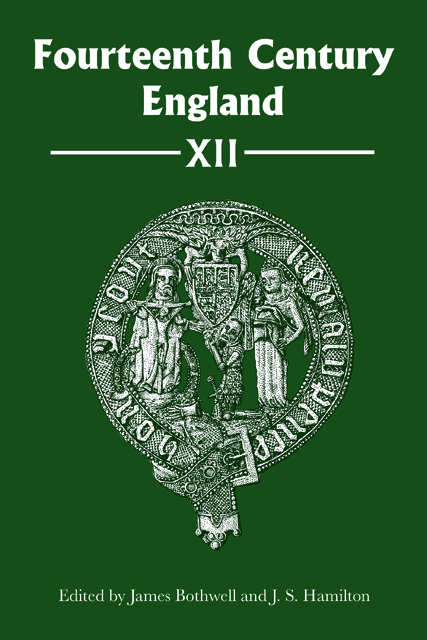Book contents
- Frontmatter
- Contents
- List of Illustrations
- List of Contributors
- Preface
- Abbreviations
- The King’s Confessors and the Royal Conscience in Late Medieval England
- ‘Such maintenance as …’: Corrodies of the Crown
- ‘Vos maisons sount pris al eops le counte’: Walter Bedwyn, Treasurer of York, and the Return of Piers Gaveston
- The Deposition of Edward II: The Kenilworth Embassies
- The English Parliament and the Trial of the ‘Peers of the Land’ in Henry of Lancaster’s Revolt (1328–29): The Origins of a Privilege
- A Brotherhood Uncovered: Investigating the Knightly Following of Thomas Beauchamp, earl of Warwick, 1329–69
- The Black Death and Clerical Prospects in England
- The Last of the Duketti? Richard II, Henry of Monmouth and the House of Lancaster
- Confusion Confounded? The Contrasting Military Fortunes of Sir William Neville (d. c.1391) and Sir William Neville of Pickhill and Rolleston (d. c.1420)
‘Such maintenance as …’: Corrodies of the Crown
Published online by Cambridge University Press: 11 January 2023
- Frontmatter
- Contents
- List of Illustrations
- List of Contributors
- Preface
- Abbreviations
- The King’s Confessors and the Royal Conscience in Late Medieval England
- ‘Such maintenance as …’: Corrodies of the Crown
- ‘Vos maisons sount pris al eops le counte’: Walter Bedwyn, Treasurer of York, and the Return of Piers Gaveston
- The Deposition of Edward II: The Kenilworth Embassies
- The English Parliament and the Trial of the ‘Peers of the Land’ in Henry of Lancaster’s Revolt (1328–29): The Origins of a Privilege
- A Brotherhood Uncovered: Investigating the Knightly Following of Thomas Beauchamp, earl of Warwick, 1329–69
- The Black Death and Clerical Prospects in England
- The Last of the Duketti? Richard II, Henry of Monmouth and the House of Lancaster
- Confusion Confounded? The Contrasting Military Fortunes of Sir William Neville (d. c.1391) and Sir William Neville of Pickhill and Rolleston (d. c.1420)
Summary
Medieval kings were adept at getting other people to pay their servants’ wages. They used ecclesiastical benefices to reward men in holy orders, but how could they support their many lay servants of modest rank? One answer was through tapping the resources of religious houses by compelling them to grant corrodies to named individuals. Corrodies were of three kinds: retirement arrangements for former abbots and priors; private deals struck by outsiders to provide board and lodging, in return for gifts of cash or property; and – those discussed here – grants to crown servants. This practice, by which kings commanded ‘maintenance’ for their servants, was long lasting. It is observable from the late thirteenth century, a time when the crown was pushing its rights against church property and privilege, and it continued into the early 1530s. The fourteenth century was, however, its heyday. Grants of maintenance were activated by privy seal warrants, but were recorded on the close rolls, and in 1974 John Tillotson examined them in a heroic article based on a page-by-page reading of the poorly indexed Calendars of Close Rolls, but he confined himself to the reigns of Edward I and Edward II. This essay will consider the whole fourteenth century, utilizing modern finding aids and recent scholarship. It will examine the fluctuations in kings’ demands, and consider developments in the nature of such corrodies during this time.
Crown corrodies were very variable; they could include cash, lodging, board, clothing, takeaway meals, and might extend even to the recipients’ servants and horses. Most grants made in Edward II’s early years suggest that recipients were gentlefolk-pensioners, their terms usually including food, clothes, shoe leather, servants, horse(s) and grooms: conditions appropriate to the grantee’s estate. Estate – that is, status – could encompass not only the quality of food, drink and housing but even the company in which they ate. Those generous terms were not to last.
With the bad weather of late summer 1314 there began a famine which afflicted all northern Europe for years. As prices rose and people starved, Edward II tried to mitigate national distress by various means, and the crown’s practice of using corrodies to support its servants became increasingly important.
- Type
- Chapter
- Information
- Fourteenth Century England XII , pp. 29 - 46Publisher: Boydell & BrewerPrint publication year: 2022



